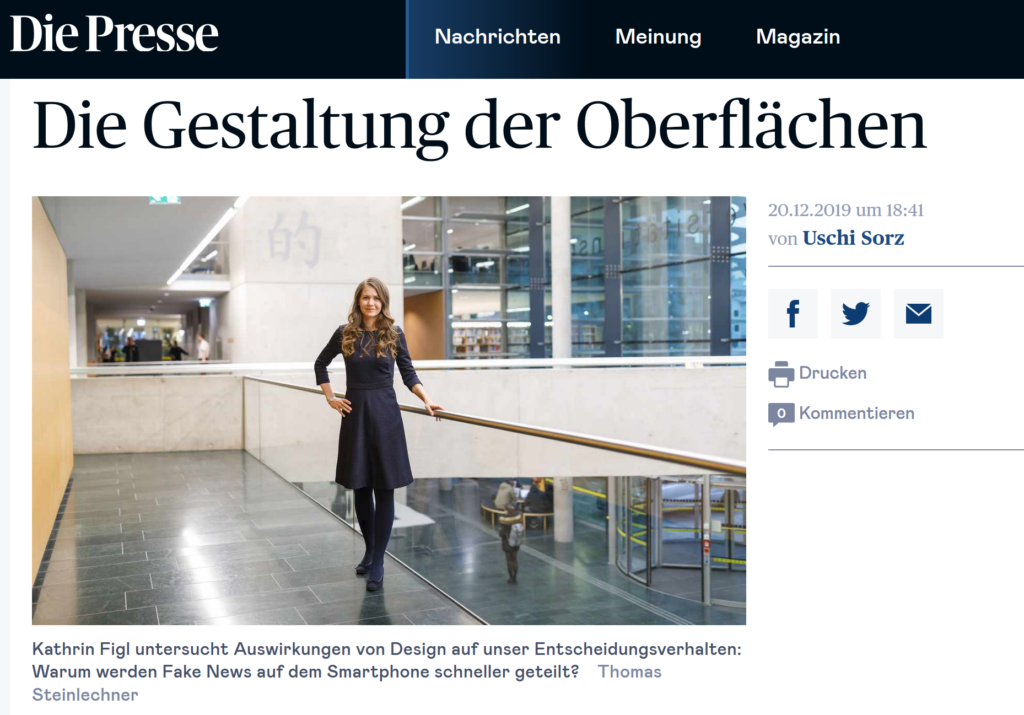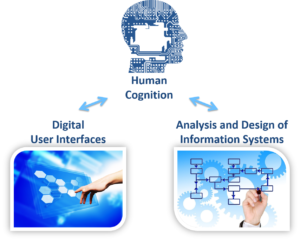My name is Kathrin Figl. I am a Full Professor (Tenured) for Information Systems at the Department of Information Systems, Production and Logistics Management at the University of Innsbruck. I hold a venia legendi (habilitation) for Information Systems (“Wirtschaftsinformatik”) from the WU – Vienna University of Economics and Business, where I have worked as an Assistant Professor at the Institute for Information Systems and New Media.
The Austrian newspaper “Die Presse” portraits my current research on research questions such as Do we think more intuitively on smartphones? How does screen design affect our decision? Why do we believe in Fake News? (Link to the online version, Link to the print version). 
In my video “Making business processes easier to understand” I give an overview of my research work, which I have carried out in the context of my habilitation (post-doctoral thesis). I was distinguished researcher of the month January 2018 of the Vienna University of Economics and Business (WU). Press Article (German and English version available): Prozesse in Unternehmen schneller, einfacher und besser erklären
“Visual business process models are an important tool for optimizing processes and tapping the full potential of digital technologies.“
Researcher of the month 01/18: Kathrin Figl
Warum verstehen Menschen Prozesse besser, wenn diese als Modelle (statt in Textform) vorliegen und welche Auswirkungen hat das auf die Ideenfindung?
Posted by
WU (Wirtschaftsuniversität Wien) on Dienstag, 2. Januar 2018
Previously, I have worked at the University of Vienna in the Business Information Systems department as well as in the department of Research Methodology and Differential Psychology. I was also a visiting research fellow with the Business Process Management group at the Queensland University of Technology, Brisbane, Australia. I received my doctoral degree (Information Systems in 2008, with honors, awarded with the Dr. Maria Schaumayer Prize) and two master’s degrees (Information Systems in 2004 and Psychology in 2006, both with honors) from the University of Vienna.
My main research areas are human-centered development and design of information systems. While earning my doctorate, I focused on e-learning, CSCW, media choice and teamwork in the information systems field. For my habilitation I started a second research stream in the areas of business process management and visual languages as a cognitive tool. I am especially interested in human interaction with conceptual models (e.g., (business) process and decision models), which are central to the analysis and design of information systems. My current research agenda focuses on the cognitively effective design of digital user interfaces (e.g., digital nudging through interface design, cognitive heuristics), human–algorithm interaction, online persuasion and manipulation (e.g., dark patterns and fake news), and algorithmic management.
A strong believer in empirical research, I conduct relevant and rigorous controlled experiments and questionnaire-based studies to test theory-based hypotheses and to contribute to theory development in the information systems field. My work has been published in journals such as the the European Journal of Information Systems, Journal of Management Information Systems, Journal of the Association for Information Systems, Decision Support Systems, Information & Management, Business & Information Systems Engineering, Requirements Engineering, the AIS Transactions on Human-Computer Interaction, the International Journal of Human-Computer Studies, Computers in Human Behavior and in leading conference proceedings (e.g., International Conference on Information Systems (ICIS), European Conference of Information Systems (ECIS), Internationale Tagung Wirtschaftsinformatik (WI), Conference on Advanced Information Systems Engineering (CAISE), International Conference on Conceptual Modeling (ER)). Three of my papers won Best Paper Awards at international conferences (the ACM Software Product Line Conference, the International Conference on e-Learning, and the World Conference on Educational Media & Technology).

